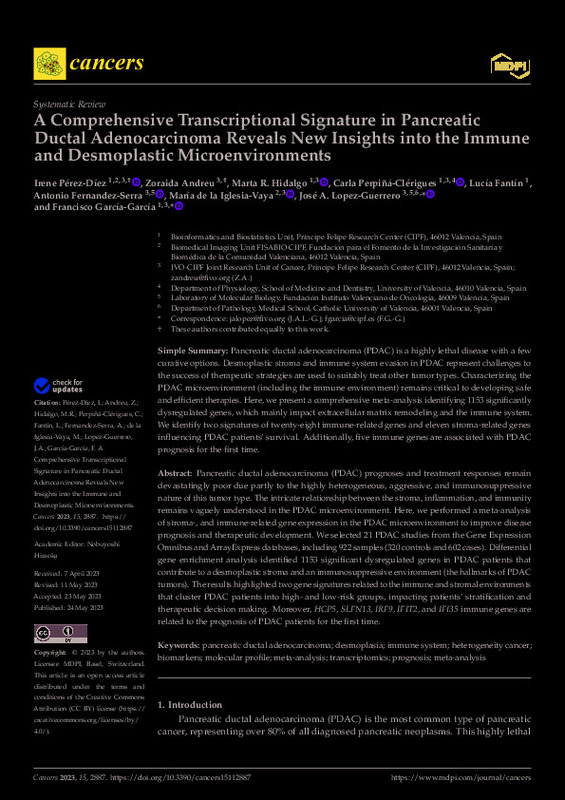JavaScript is disabled for your browser. Some features of this site may not work without it.
Buscar en RiuNet
Listar
Mi cuenta
Estadísticas
Ayuda RiuNet
Admin. UPV
A Comprehensive Transcriptional Signature in Pancreatic Ductal Adenocarcinoma Reveals New Insights into the Immune and Desmoplastic Microenvironments
Mostrar el registro sencillo del ítem
Ficheros en el ítem
| dc.contributor.author | Pérez-Díez, Irene
|
es_ES |
| dc.contributor.author | Andreu, Zoraida
|
es_ES |
| dc.contributor.author | Hidalgo, Marta R.
|
es_ES |
| dc.contributor.author | Perpiñá-Clérigues, Carla
|
es_ES |
| dc.contributor.author | Fantín, Lucía
|
es_ES |
| dc.contributor.author | Fernández-Serra, Antonio
|
es_ES |
| dc.contributor.author | De la Iglesia-Vaya, María
|
es_ES |
| dc.contributor.author | López-Guerrero, José A.
|
es_ES |
| dc.contributor.author | García-García, Francisco
|
es_ES |
| dc.date.accessioned | 2024-04-29T18:08:45Z | |
| dc.date.available | 2024-04-29T18:08:45Z | |
| dc.date.issued | 2023-05-24 | es_ES |
| dc.identifier.uri | http://hdl.handle.net/10251/203856 | |
| dc.description.abstract | [EN] Pancreatic ductal adenocarcinoma (PDAC) prognoses and treatment responses remain devastatingly poor due partly to the highly heterogeneous, aggressive, and immunosuppressive nature of this tumor type. The intricate relationship between the stroma, inflammation, and immunity remains vaguely understood in the PDAC microenvironment. Here, we performed a meta-analysis of stroma-, and immune-related gene expression in the PDAC microenvironment to improve disease prognosis and therapeutic development. We selected 21 PDAC studies from the Gene Expression Omnibus and ArrayExpress databases, including 922 samples (320 controls and 602 cases). Differential gene enrichment analysis identified 1153 significant dysregulated genes in PDAC patients that contribute to a desmoplastic stroma and an immunosuppressive environment (the hallmarks of PDAC tumors). The results highlighted two gene signatures related to the immune and stromal environments that cluster PDAC patients into high- and low-risk groups, impacting patients¿ stratification and therapeutic decision making. Moreover, HCP5, SLFN13, IRF9, IFIT2, and IFI35 immune genes are related to the prognosis of PDAC patients for the first time. | es_ES |
| dc.description.sponsorship | This research was supported by and partially funded by the Institute of Health Carlos III (project IMPaCT-Data, exp. IMP/00019), co-funded by the European Union, European Regional Development Fund (ERDF, A way to make Europe ), and PID2021-124430OA-I00 funded by MCIN/AEI/10.13039/501100011033/FEDER, UE ( A way to make Europe ). This work has been carried out under the framework of the ULISES project: H2020-FETOPEN-2018-2019-2020-01 Contract nº: 899708. | es_ES |
| dc.language | Inglés | es_ES |
| dc.publisher | MDPI AG | es_ES |
| dc.relation.ispartof | Cancers | es_ES |
| dc.rights | Reconocimiento (by) | es_ES |
| dc.subject | Pancreatic ductal adenocarcinoma | es_ES |
| dc.subject | Desmoplasia | es_ES |
| dc.subject | Immune system | es_ES |
| dc.subject | Heterogeneity cancer | es_ES |
| dc.subject | Biomarkers | es_ES |
| dc.subject | Molecular profile | es_ES |
| dc.subject | Meta-analysis | es_ES |
| dc.subject | Transcriptomics | es_ES |
| dc.subject | Prognosis | es_ES |
| dc.title | A Comprehensive Transcriptional Signature in Pancreatic Ductal Adenocarcinoma Reveals New Insights into the Immune and Desmoplastic Microenvironments | es_ES |
| dc.type | Artículo | es_ES |
| dc.identifier.doi | 10.3390/cancers15112887 | es_ES |
| dc.relation.projectID | info:eu-repo/grantAgreement/AEI/Plan Estatal de Investigación Científica y Técnica y de Innovación 2021-2023/PID2021-124430OA-I00/ES/ESTUDIO DE LAS DIFERENCIAS DE SEXO EN ENFERMEDADES NEURODEGENERATIVAS CON ABORDAJES INTEGRATIVOS DE DATOS OMICOS E IMAGEN BIOMEDICA/ | es_ES |
| dc.relation.projectID | info:eu-repo/grantAgreement/EC/H2020/899708/EU/Immunological incompatibility as a basis for cancer curing and vaccination/ | es_ES |
| dc.relation.projectID | info:eu-repo/grantAgreement/ISCIII//IMP%2F00019/ | es_ES |
| dc.rights.accessRights | Abierto | es_ES |
| dc.description.bibliographicCitation | Pérez-Díez, I.; Andreu, Z.; Hidalgo, MR.; Perpiñá-Clérigues, C.; Fantín, L.; Fernández-Serra, A.; De La Iglesia-Vaya, M.... (2023). A Comprehensive Transcriptional Signature in Pancreatic Ductal Adenocarcinoma Reveals New Insights into the Immune and Desmoplastic Microenvironments. Cancers. 15(11). https://doi.org/10.3390/cancers15112887 | es_ES |
| dc.description.accrualMethod | S | es_ES |
| dc.relation.publisherversion | https://doi.org/10.3390/cancers15112887 | es_ES |
| dc.type.version | info:eu-repo/semantics/publishedVersion | es_ES |
| dc.description.volume | 15 | es_ES |
| dc.description.issue | 11 | es_ES |
| dc.identifier.eissn | 2072-6694 | es_ES |
| dc.identifier.pmid | 37296850 | es_ES |
| dc.identifier.pmcid | PMC10252129 | es_ES |
| dc.relation.pasarela | S\494821 | es_ES |
| dc.contributor.funder | European Commission | es_ES |
| dc.contributor.funder | Instituto de Salud Carlos III | es_ES |
| dc.contributor.funder | Agencia Estatal de Investigación | es_ES |
| dc.contributor.funder | European Regional Development Fund | es_ES |








